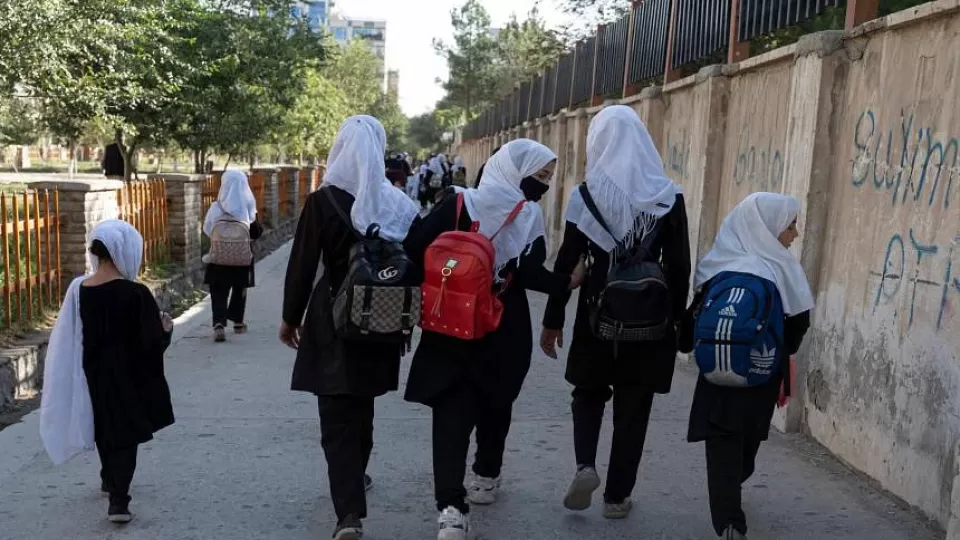December 29, 2022
ISLAMABAD – IN July of this year, while the world was busy with so many other things, a group of Afghan children were in the fields near the village of Bolak Wandi in Helmand province, looking after some grazing sheep. Curiosity got the better of them when one of the children saw a metal object that was half buried in the ground. Excitedly, the children crowded around the object, thinking that they had found scrap material which could be sold off, and soon began to argue amongst themselves as to had spotted the item first.
And then came the explosion: the object was, in fact, a mortar shell that had been left behind, most likely by the invading Americans. This, unfortunately, is not uncommon in Afghanistan, where conflict of several decades has left behind such death traps in almost all the provinces. In this case, one child died instantly, another three died at the hospital.
As it turns out, an NGO that was doing the work of removing land mines and mortar shells had fired its staff not long after the Taliban took over in August 2021. The leftover armament may well be a metaphor for the ethical ease with which the world at large looked away from the failed effort to do away with the Taliban. The Taliban, on the other hand, have lived up to their reputation. Their latest obscurantist edict has been to ban women from studying in universities and working in local and international NGOs. The move has generated dismay in most of the world — surprising, since Afghanistan, over the months, has been all but forgotten by the powers that promised to liberate its women. Afghan women have also expressed their extreme dismay, forced as they are to continue to live in a country ruled by elements whose entire mission is to be visibly contrarian to what goes on in the rest of the world. Women’s education at university appears to have whetted their misogynistic ire.
Much like the Afghan children who die when mortar shells or land mines explode under their feet, Afghan women face oblivion — though of a different kind. They will be entirely alone in dealing with this new form of exclusion. In a few days, the hemming and hawing and chest-beating will end once the existence of the Taliban’s decades-long misogyny has been lamented as a matter of form. The women, however, will face the darkness of both exclusion and isolation. No possibility of furthering educational goals, no chance to discuss ideas, no intellectual growth.
The diplomatic cutting off of Afghanistan extends to its citizens, who are already facing many deprivations under the Taliban rulers.
I point this out because it is important to place this latest edict meant to crush the future of Afghan women in a context that is, unfortunately, ignored by Western journalists and news agencies. The Taliban are isolating and excluding Afghan women, and must be challenged. But the world must also be taken to task for having isolated and excluded Afghanistan since the very day the Americans decided they were no longer interested in sorting things out in that blighted land.
Recently, the NGOs Save the Children and Médecins Sans Frontières complained that they were afraid that their inability to reach Afghan children would lead to many deaths. This is undoubtedly true; but it is also true that the world has nodded its approval for the continued freezing of billions of dollars of Afghan currency reserves by the United States. The reason, of course, is that the Taliban government would receive the money when it should not be given anything at all. It is the same reason that is offered up for the diplomatic isolation of the country. One understands this logic, but it is also true that to prevent more deaths of Afghan children, the funds need to be unfrozen. The US had announced earlier that it would be willing to release about $3.5bn of the amount to help the children, but would ensure that the amount would bypass the Taliban. But now, with international NGOs ready to leave, there will be no chance of getting to the world’s most vulnerable little ones.
There is another reason why the continued freeze on Afghan funds is counterproductive. When forces like the Taliban have nothing to lose, then why should they bother aligning themselves with any values of the liberal world order? Instead, they feel empowered to do whatever they please and crush the dreams of women and let children die, rather than making the services of international NGOs available to them. What the current boycott accomplishes is to permit the former occupiers of the country to claim that they are being tough on the Taliban even as they abandon Afghan interests — and the people — entirely.
The diplomatic isolation of Afghanistan extends to its citizens, who are already facing the many deprivations of life under the Taliban. Holding an Afghan passport means having the worst passport in the world — one that permits visa-free travel to nowhere. The Afghan Taliban, rotten to the core, have banned Afghan women from universities and Afghan girls from high schools — but the world collectively has banned Afghans from nearly everywhere. This last point is important because university education itself can and should mean admission to a wider interconnected world, the ability to travel to other institutions, to academic conferences, and to take advantage of global knowledge exchange.
The Western world at large and the US in particular owe more to the Afghan people. It is impossible to convince the Taliban of anything, inured as they are to reason or compassion. One would hope that the rest of the world can be more moved by the plight of Afghan women and children and realise that the way things are is not the way things should be.
The writer is an attorney teaching constitutional law and political philosophy.


